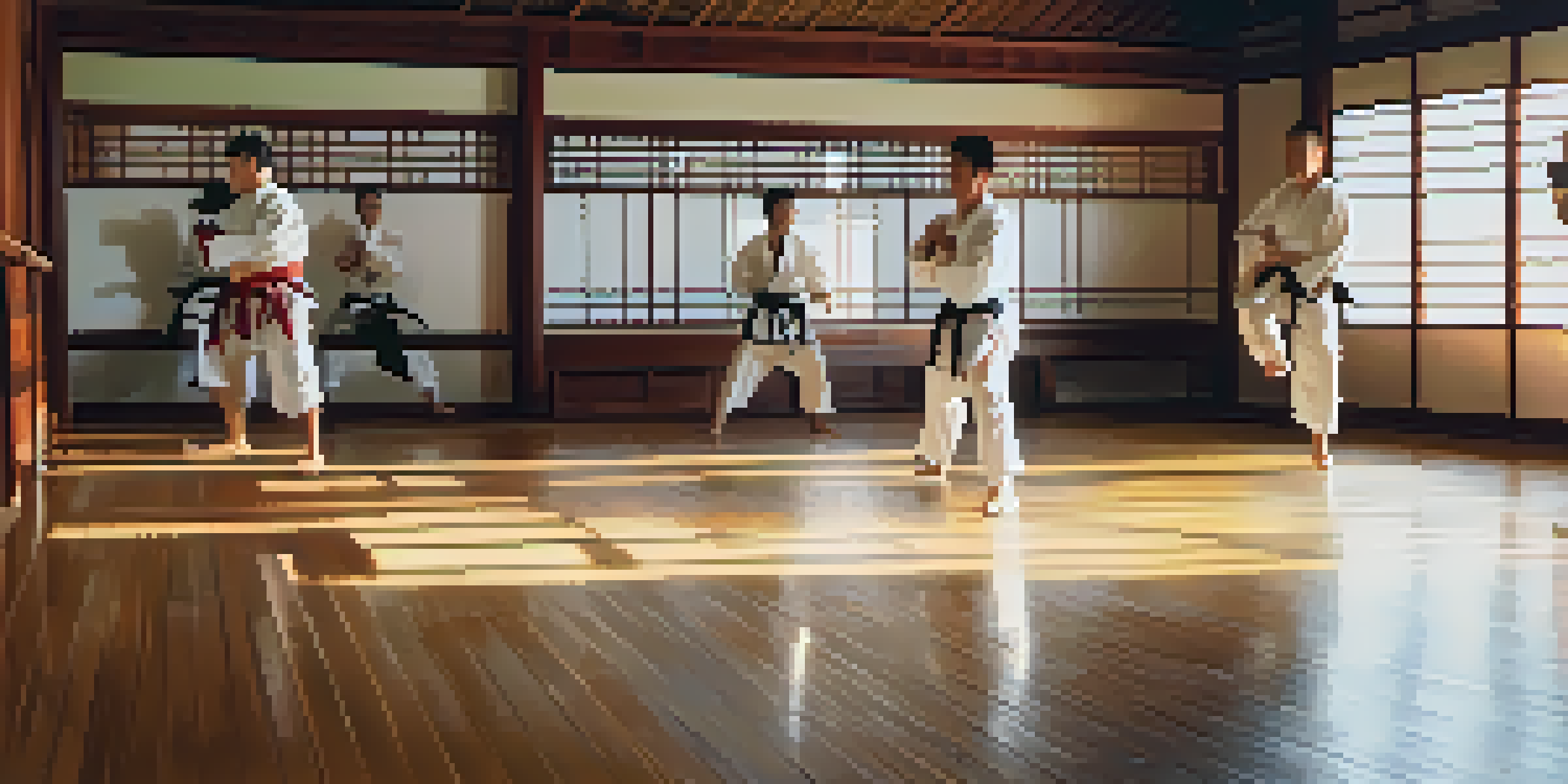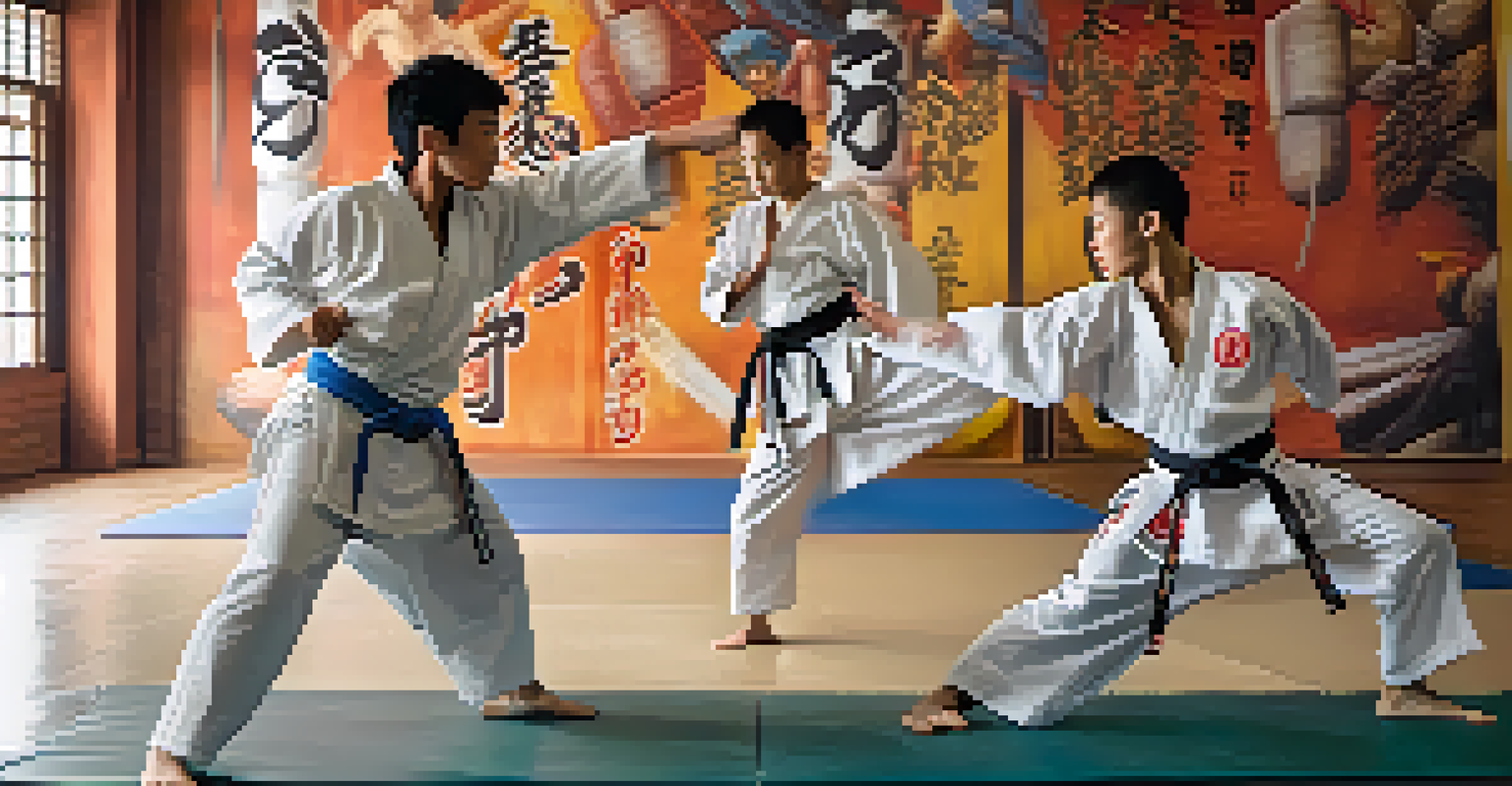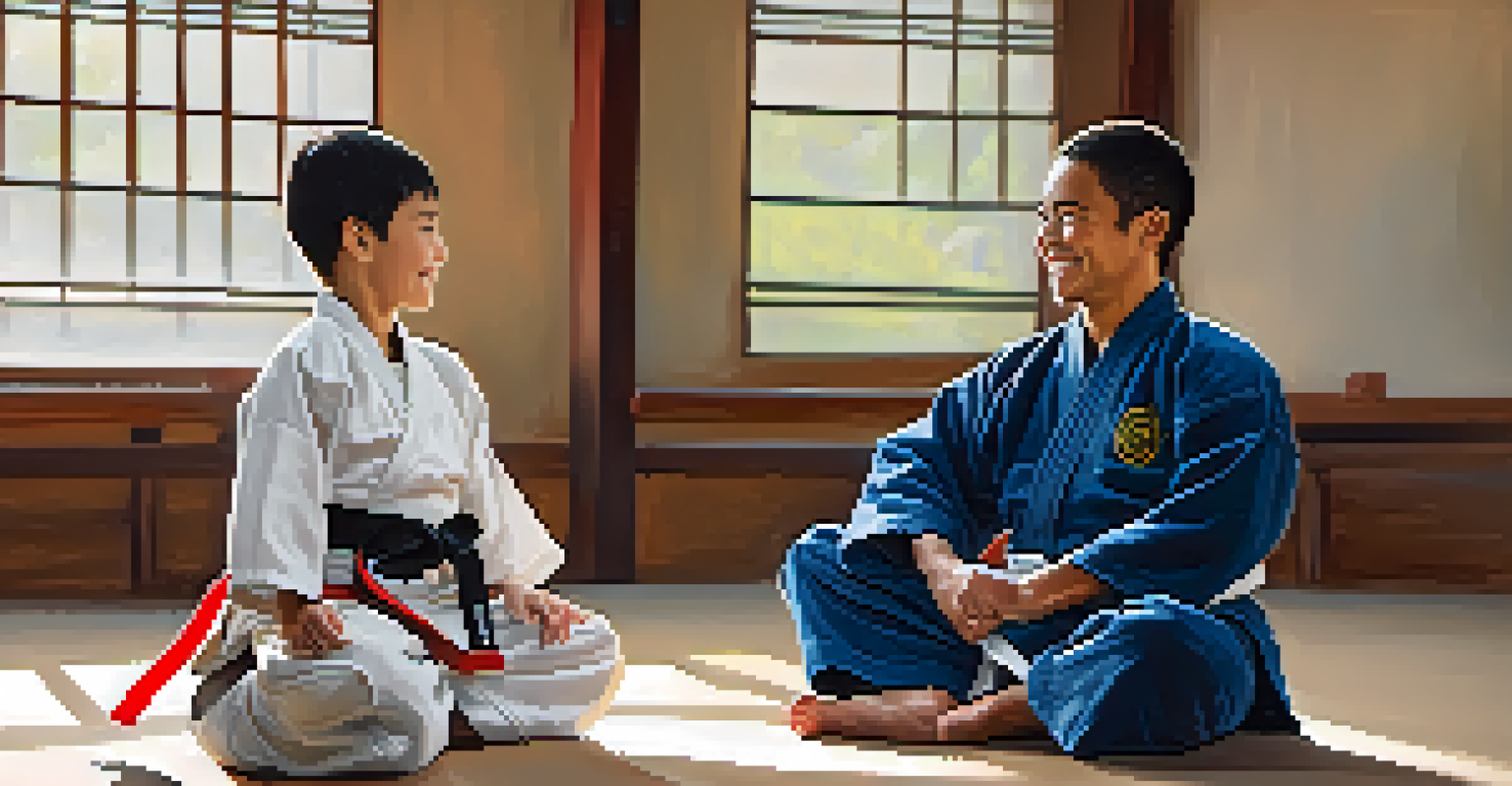Creating Community: Martial Arts and Mental Health Support

The Power of Community in Martial Arts
Martial arts isn't just about physical combat; it's a powerful community builder. Practitioners often form tight-knit bonds, sharing experiences that go beyond the dojo. This camaraderie creates a supportive environment where individuals can thrive both mentally and emotionally.
The greatest weapon against stress is our ability to choose one thought over another.
In these communities, members uplift each other, celebrating victories and offering support during struggles. It's like having a second family that understands the unique challenges each person faces, especially regarding mental health. This sense of belonging can significantly enhance one's overall well-being.
Moreover, martial arts classes encourage collaboration and teamwork, reinforcing connections among participants. Through shared practices, such as sparring or group drills, individuals develop trust and friendships that can positively impact their mental health long after they leave the dojo.
Martial Arts: A Path to Mental Resilience
Training in martial arts often teaches valuable life skills, such as discipline and perseverance. These qualities are crucial not only in the dojo but also in managing mental health challenges. The structured environment of martial arts fosters resilience, providing individuals with tools to cope with stress and anxiety.

As practitioners face physical challenges, they also confront psychological barriers. Overcoming these hurdles in a supportive setting can boost self-esteem and provide a sense of accomplishment. This newfound confidence can translate into everyday life, helping individuals navigate their mental health journeys more effectively.
Community Strengthens Mental Health
Martial arts fosters a supportive community that enhances mental well-being through shared experiences and camaraderie.
The physical exertion involved in martial arts also releases endorphins, natural mood lifters that can alleviate feelings of depression and anxiety. Coupled with the mental discipline gained from training, martial arts can become a powerful ally in achieving and maintaining mental well-being.
Creating Safe Spaces for Open Dialogue
Martial arts schools often prioritize creating a safe space for students to express their feelings. Instructors frequently encourage open discussions about mental health, making it easier for individuals to seek help when needed. This proactive approach can break the stigma surrounding mental health, fostering a culture of acceptance within the community.
Strength does not come from physical capacity. It comes from an indomitable will.
By integrating mental health awareness into training sessions, instructors equip students with knowledge about managing stress and anxiety. This blend of physical and mental education reinforces the idea that mental health is just as important as physical fitness. The result is a more holistic approach to well-being.
Furthermore, these safe spaces allow individuals to share their struggles and triumphs with one another. This vulnerability strengthens community bonds and provides a platform for collective healing, making martial arts an ideal environment for personal growth and mental support.
The Role of Mentorship in Martial Arts
Mentorship plays a vital role in martial arts, with experienced practitioners guiding newcomers. This relationship often extends beyond physical training, as mentors provide emotional support and encouragement. Having someone to look up to can be pivotal for individuals dealing with mental health challenges.
Mentors often share their own experiences, illustrating that it's okay to confront personal struggles. This openness fosters trust and creates a safe environment for dialogue. When students see their mentors navigating challenges, it can inspire them to face their own obstacles head-on.
Resilience Through Training
Engaging in martial arts builds discipline and perseverance, equipping individuals with tools to manage mental health challenges.
Additionally, the mentor-mentee dynamic cultivates a sense of accountability. Students feel more motivated to engage in their training and mental health journeys when they know someone is cheering them on. This support network can make all the difference in maintaining mental well-being.
Physical Activity: A Catalyst for Mental Health
Engaging in martial arts is an excellent way to incorporate physical activity into daily life. Regular exercise is known to reduce symptoms of anxiety and depression, making martial arts an effective tool for mental health support. The combination of physical exertion and mental focus creates a unique environment for healing.
In martial arts, the emphasis on technique and form requires mental presence, diverting attention away from stressors. This mindfulness aspect can be incredibly beneficial for those struggling with mental health issues, as it encourages living in the moment. It's like a mental reset that leaves practitioners feeling rejuvenated.
Moreover, the physicality of martial arts provides an outlet for pent-up emotions. Whether it's through striking, grappling, or forms, practitioners can channel their feelings into their training. This release can lead to improved mood and a greater sense of balance in life.
Building Lifelong Friendships Through Training
The shared experience of training in martial arts often leads to lasting friendships. As students progress together, they form bonds that extend beyond the dojo. These friendships can provide significant emotional support and companionship, essential for mental health.
Participating in group classes and events fosters a sense of unity among practitioners. Celebrating milestones together, such as belt promotions, reinforces the importance of community. These shared experiences create memories that can help individuals feel more connected and supported.
Mindfulness Boosts Emotional Balance
The focus and mindfulness required in martial arts training help practitioners manage stress and promote mental clarity.
Additionally, friendships formed in martial arts can lead to social activities outside of training. Whether it’s going out for a meal or attending a seminar, these interactions enhance social connections, which are crucial for mental well-being. The camaraderie developed through martial arts can truly enrich one’s life.
Mindfulness and Focus in Martial Arts Training
Martial arts training emphasizes mindfulness and focus, which can significantly benefit mental health. Practicing techniques requires concentration, allowing individuals to quiet their minds and focus on the present. This aspect of training can serve as a form of meditation, easing anxiety and promoting a sense of peace.
As students learn to control their breathing and movements, they cultivate a deeper understanding of their bodies and minds. This connection can enhance self-awareness, enabling individuals to recognize their emotional triggers. With this knowledge, practitioners can more effectively manage their mental health.

Incorporating mindfulness into martial arts practice encourages individuals to develop coping strategies. By learning to remain calm under pressure, students can apply these skills to everyday situations. This approach not only enhances their martial arts journey but also contributes positively to their mental well-being.